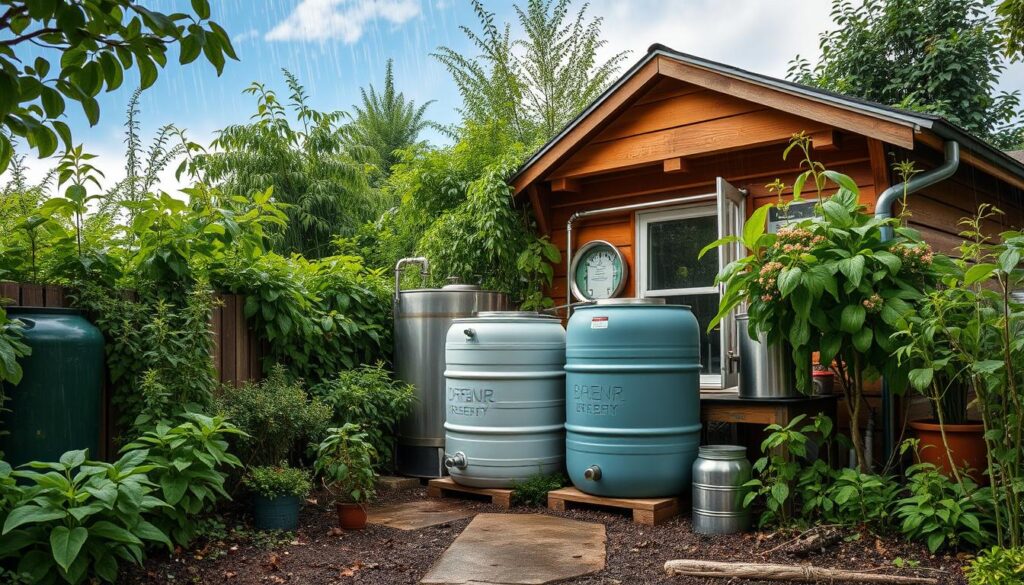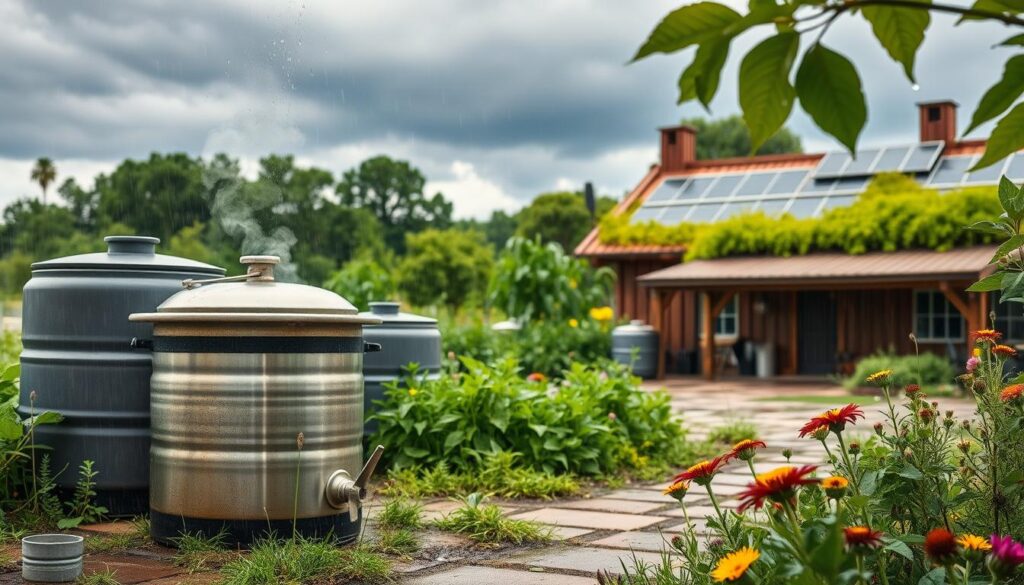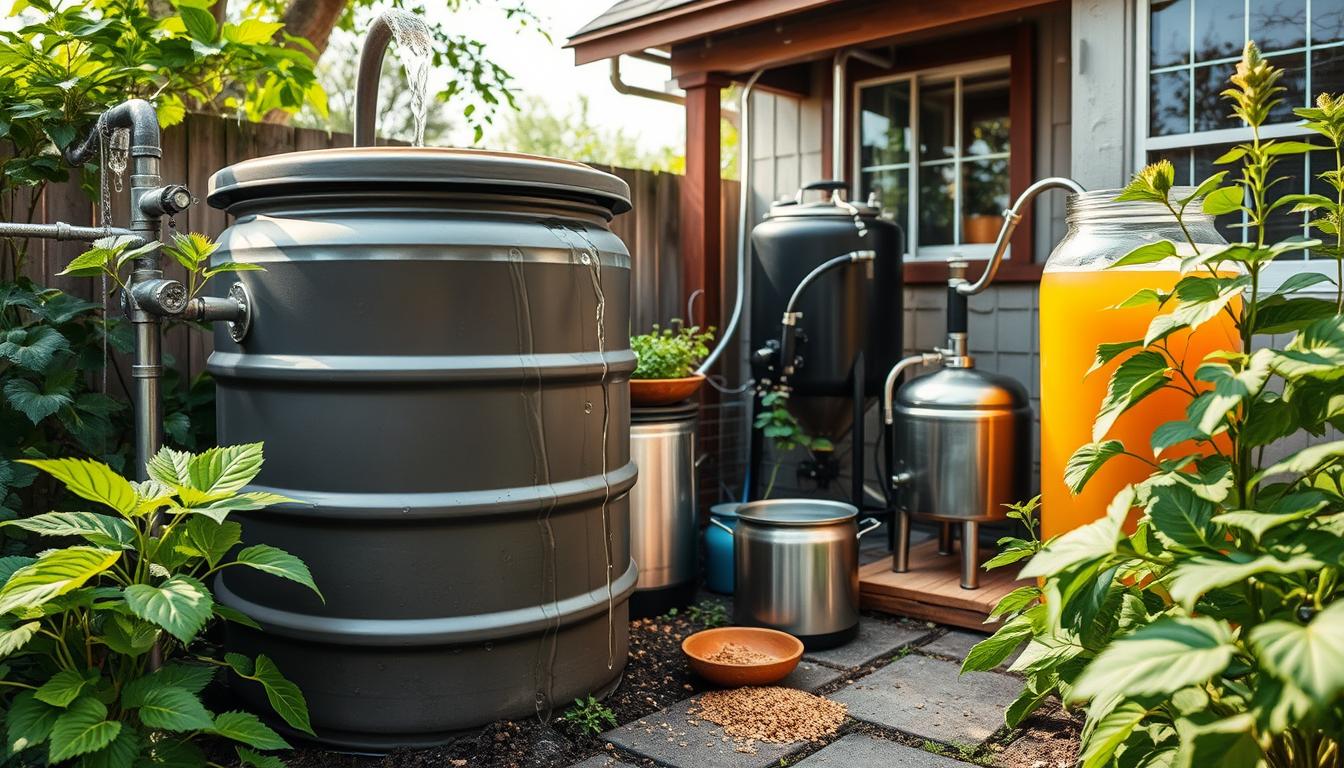Home brewers can save up to 250,000 liters of freshwater yearly by using rainwater. This eco-friendly approach is changing how beer enthusiasts craft their drinks. Rainwater beer is the future of home brewing, as pure as the sky.
We’ll explore the science of rainwater filtration and its benefits in beer production. You’ll learn how to set up your own rainwater harvesting system for brewing. We’ll also look at breweries that have embraced this sustainable practice.
Discover how rainwater can improve your beer-making and help the environment. This movement is transforming the beer industry, one drop at a time. Let’s uncover the secrets of this thriving trend together.
The Rainwater Beer Revolution
Breweries are now using locally captured rainwater for eco-friendly beer production. This trend is gaining popularity among both large and small breweries. The 5 Seasons Brewery in Atlanta leads this movement with their advanced rainwater harvesting system.
Breweries Embracing Rainwater for Sustainable Beer Production
Crawford Moran, the master brewer, says filtered rainwater creates crisper, better-tasting beer than tap water. The brewery also uses vegetable oil for boiling ingredients. They donate spent grains to local farmers as part of their sustainable practices.
The Benefits of Using Rainwater in Beer Brewing
Rainwater enhances beer flavor and aroma while reducing environmental impact. It’s a renewable, pure water source that decreases reliance on municipal supplies. Using rainwater also helps breweries minimize their carbon footprint.
“The filtered rainwater results in a crisper, better-tasting beer compared to using standard tap water.”

The rainwater brewing movement is growing rapidly. More breweries are recognizing its benefits for sustainable beer production. These innovative breweries are paving the way for a greener, tastier future in the beer industry.
The Science Behind Rainwater Filtration for Brewing
Brewing top-notch beer from rainwater demands careful filtration. Intewa, a German firm, developed a micro-filtering method to purify rainwater. This system removes bacteria, harmful substances, and even medication traces from rainwater.
The process starts with pre-filtering to remove large pollutants. Then, a membrane-based system uses micro-fibers with tiny pores to filter out impurities. This ensures the rainwater is safe and ideal for brewing.
Multi-Stage Filtration and Purification Process
The filtered rainwater is hygienically pure, with a pH of 7.8. Its hardness measures 0.73 ppm, making it perfect for brewing. This level of purification prevents contaminants from affecting the beer’s quality.
- Pre-filtering to remove large pollutants
- Membrane-based purification system using micro-fibers with tiny pores
- Produces rainwater with a pH of 7.8 and hardness of 0.73 ppm
Water quality is crucial in beer brewing. It makes up to 97% of the final product. Using filtered rainwater helps create exceptional beer with great taste and clarity.
This method also reduces environmental impact. Brewers can make consistent, high-quality beer while being eco-friendly.

“The secret to producing high-quality beer from rainwater lies in the filtration and purification process.”
Setting Up a Rainwater Harvesting System for Home Brewing
Home brewing with rainwater offers a unique, eco-friendly approach to crafting beer. This natural water source can enhance your brews’ flavor and aroma. A rainwater harvesting system allows brewers to tap into a high-quality, sustainable water supply.
Setting up a rainwater harvesting system involves several key steps. Let’s explore the process and its benefits for home brewing.
- Collection Tank: Install a food-grade, airtight tank to capture roof runoff. Tank sizes vary from 55 to 10,000 gallons, depending on your needs.
- Multi-Stage Filtration: Collected rainwater undergoes filtration similar to commercial breweries. This includes pre-filtering for debris and membrane-based purification for remaining contaminants.
- Sterilization and Storage: Store filtered rainwater in food-safe, airtight containers until use. The brewing process helps sterilize the water, ensuring safety.
Using rainwater for brewing reduces environmental impact while creating unique, flavorful beers. It showcases the benefits of natural water in the brewing process.
| Rainwater Harvesting Benefits for Home Brewing | Potential Challenges |
|---|---|
|
|

A rainwater harvesting system opens up new possibilities for sustainable, flavorful beer. With proper filtration, this natural water becomes the foundation for exceptional brews.
It showcases the perfect blend of art and science in home brewing. Explore this eco-friendly option to elevate your brewing game.
using rainwater in beer production
Rainwater brewing is changing the beer industry. More breweries use soft, mineral-free rainwater to improve their beer’s flavor. This method helps create beer with a crisper, cleaner taste than traditional brewing.
Enhancing Flavor and Aroma with Soft Rainwater
Filtered rainwater’s soft nature allows malt and hops to stand out. This creates a unique taste sensation in beer. Intewa’s managing director says soft water enhances the malt aromas in beer.
Intewa’s ‘Brain’ beer is a success story. This Trappist-style brew uses filtered rainwater for its second fermentation. The result is a distinctive and flavorful beer.
Rainwater’s low pH and lack of minerals contribute to beer’s balance. These qualities help brewers craft complex beverages. Beer enthusiasts appreciate the enhanced flavor profiles from rainwater brewing.
| Rainwater Brewing Advantages | Rainwater Brewing Challenges |
|---|---|
|
|
Using rainwater in beer production creates exceptional-tasting beers and supports sustainability. The rainwater brewing trend is growing rapidly. Beer lovers are discovering the benefits of soft water for brewing.

Sustainable Brewing Practices
The brewing industry is adopting innovative practices to reduce its environmental impact. The Product Environmental Footprint Category Rules (PEFCR) for beer offer a standardized framework. This framework helps evaluate the sustainability of brewing processes.
The PEFCR Beer model assesses the environmental footprint of beer production. It allows breweries to compare their performance against industry benchmarks. Pilario’s PEFCR Beer tool simplifies this calculation process for breweries.
Reducing Environmental Impact of Beer Production
Sustainable brewing practices cover water conservation, energy efficiency, and waste management. Breweries can use energy-efficient equipment and install solar panels. They can also recycle or reuse materials to reduce their carbon footprint.
Water conservation is crucial in sustainable brewing. Many breweries now use rainwater harvesting systems. These systems help reduce reliance on municipal water sources and lower overall water consumption.
| Sustainable Brewing Practices | Benefits |
|---|---|
| Energy-efficient equipment | Reduced energy consumption and costs |
| Renewable energy sources | Decreased carbon emissions and reliance on fossil fuels |
| Water conservation | Reduced freshwater usage and wastewater generation |
| Recycling and reusing materials | Decreased waste and resource depletion |
Adopting sustainable practices helps breweries reduce their environmental impact. It also sets them apart in the market. These efforts appeal to eco-conscious consumers who value sustainability.

Case Studies: Breweries Pioneering Rainwater Beer
Breweries are embracing rainwater in beer production, leading the way in sustainable beer production. These eco-friendly breweries using rainwater are creating eco-friendly beer alternatives.
The 5 Seasons Brewery in Atlanta, Georgia, partners with RainHarvest Systems. They use a cutting-edge rainwater collection and filtration system. This provides high-quality rainwater for brewing exceptional beer.
“The filtered rainwater has a pH of 7.8, a hardness of 0.73 ppm, and is completely free of bacteria and other microbes, making it an ideal water source for brewing,” says the brewery’s master brewer.
Their sustainable beer production efforts have yielded impressive results. The Golden Number Ale, brewed with rainwater, tastes crisper and better than previous tap water batches.
HooDoo Brewing Co. in Fairbanks, Alaska, is another rainwater brewing pioneer. They use local supplies and ingredients from Seattle and Pacific Northwest ports. Their innovative rainwater harvesting system supports this approach.
These breweries craft exceptional beers using eco-friendly methods. They’re paving the way for a greener future in the brewing industry.

Rainwater Harvesting Laws and Regulations
Rainwater harvesting for home brewing is growing in popularity. It’s vital to understand local laws and regulations for this sustainable practice. These rules can vary greatly across regions.
Staying compliant with these requirements is essential. The legalities and guidelines can differ significantly depending on your location.
Understanding Local Guidelines for Rainwater Collection
Rainwater harvesting regulations are often set at the state or county level. It’s crucial to research the specific guidelines in your area. Some places may limit collection system sizes and types.
Other areas might require permits or restrict how you can use harvested water. Always check local rules before setting up a system.
Colorado limits rainwater harvesting to 110 gallons maximum. Illinois allows up to 5,000 gallons without a permit. Cisterns for whole-house use can hold 5,000 to 10,000 gallons or more.
Most states don’t regulate rain barrels, except Colorado. Cisterns may need professional design for proper harvesting and filtration. Research your area’s laws to ensure safe and legal implementation.
| State | Rainwater Harvesting Regulations |
|---|---|
| Colorado | Maximum of 110 gallons of rainwater can be harvested |
| Illinois | Up to 5,000 gallons of rainwater can be harvested without a permit |
| Washington | Rainwater collection for potable use is not permitted in some counties, while others allow it |
Rainwater can contain harmful contaminants like bacteria, parasites, viruses, and chemicals. This makes it risky for drinking or use on edible plants. Proper filtration is crucial.
Systems like the Pulsar MAX PLUS Ultraviolet Disinfection System ensure water safety. These are essential for home brewing and other applications.
Cost Savings and Return on Investment
Rainwater harvesting for home brewing offers cost savings and a good return on investment. Stroud Brewery’s system collects 250,000 liters yearly, saving $800 annually. 5 Seasons Brewery in Atlanta reduced municipal water costs with its collection system.
The financial benefits of sustainable brewing go beyond water bill savings. Using rainwater reduces water consumption and lowers energy costs for treatment. This makes it an attractive option for eco-conscious home brewers.
| Brewery | Rainwater Harvesting System | Annual Cost Savings |
|---|---|---|
| Stroud Brewery | Collects up to 250,000 liters | $800 |
| 5 Seasons Brewery | Rainwater collection and filtration | Reduced municipal water costs |
The return on investment for rainwater harvesting can be significant for home brewers. It improves cost savings of rainwater brewing and adds to financial benefits of sustainable brewing.
A reliable collection and filtration system offers long-term savings. It also reduces environmental impact, boosting sustainability and profitability for home brewers.
“The environmental benefits of using rainwater, such as reduced water consumption and lower energy costs associated with water treatment, can further enhance the financial incentives for home brewers to adopt this sustainable practice.”
Conclusion
Rainwater beer is revolutionizing home brewing. It offers a sustainable, cost-effective water source for crafting unique, high-quality beers. Home brewers can reduce their environmental impact while enhancing flavor and aroma.
Science supports rainwater filtration for beer production. Successful breweries have proven its benefits. The average water footprint of beer is decreasing due to optimization efforts.
Some brewers aim to use only three liters of water per liter of beer. This makes using rainwater in beer production an attractive option.
The demand for sustainable brewing practices and eco-friendly beer production is growing. Rainwater brewing has a promising future in the craft beer industry.
As more home brewers adopt this method, we’ll see more unique, sustainable beers. The rainwater beer revolution is transforming home brewing.

